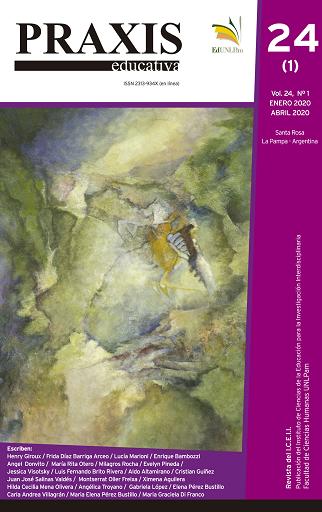Alfabetización funcional: más que un aprendizaje, una experiencia de vida
DOI:
https://doi.org/10.19137/https://dx.doi.org/10.19137/praxiseducativa-2020-240111Palabras clave:
educaciòn - apredizaje-familia- contextoResumen
La alfabetización funcional ha llegado a ser una necesidad creciente en educación en varios países de América Latina. La presente investigación detalla los resultados obtenidos de un proceso de alfabetización funcional destinado a 21 apoderados de un colegio en Chile. La base investigativa tuvo un fundamento centrado en el paradigma interpretativo, pues, se buscaba crear una cercanía a las realidades de los sujetos en forma holística y natural, comprendiendo así la sensibilidad de cada apoderado desde la experiencia de ser alfabetizado. Se aplicó un diagnóstico para identificar el nivel de aprendizaje que tenía cada sujeto. Con estos datos se procedió a la elaboración de una propuesta didáctica, considerando la diversidad de edades que había en el grupo y las estrategias que deberían utilizarse para dinamizarlas. Los resultados revelaron que luego de un año años los apoderados mostraron un 80% de mejoramiento en su nivel de alfabetización respecto a la situación inicial. Además, se observó que el grupo de apoderados alfabetizados mejoró su autoconfianza y se convirtió en un sujeto que comunica y comparte sus experiencias de vida.
Descargas
Citas
Alonso, L. (1994): Sujeto y discurso: “El lugar de la entrevista abierta en las prácticas de la Sociología Cualitativa”, Madrid. Ed. Síntesis.
Braslavsky, B. (2003). ¿Qué se entiende por alfabetización? Lectura y vida, 24(2), 2-17.
Briones, G. (20029. Epistemología de las ciencias sociales, pág. 36,
Cohen, L. (1990). Métodos de investigación educativa. Madrid: Muralla.
Del Castillo, J. J. (2005). Redefinición del analfabetismo: el analfabetismo funcional. Revista de Educación, (338),273-294.Recuperado de: http://www.toscana.edu.co/cms/images_cms/2c0afe_Pb3jq1Oz.pdf.
Espinoza Díaz, O., Loyola Campos, J., Castillo Guajardo, D. y González, L. (2014).La Educación de Adultos en Chile: Experiencias y Expectativas de los Estudiantes de la Modalidad Regular. Última década, 22(40), 159-181.
Ferrero, E. (1989). Los Hijos del Analfabetismo, Propuesta para la alfabetización de América Latina. México: María Orcos.
Galindo Cáceres, J. (1998): la historia oral y de vida: del recurso técnico a la experiencia de investigación. México D. F., Prentice Hall, Pearson Educación y Addison Wesley.
Gibbs, G. (2012): El análisis de los datos cualitativos en investigación cualitativa. Morata.
Husserl, E. (1996).Diccionario de Filosofía. México: Editorial Diana.
Ministerio de Educación. (2009). Manual del Monitor Contigo Aprendo. Santiago: MINEDUC.
Ministerio de Educación. (2008). Marco para la Buena Enseñanza. Santiago: CEPEIP.
Mural. (2016). Educación de Adultos. Recuperado de: http://mural.uv.es/amarjau/conceptos.html
Parcerisa, A. (2004). Didáctica en la educación social. Barcelona: Graó.
Pérez, J (2001) “Programación Neurolingüística y sus estilos de aprendizaje”,
disponible en http://www.aldeaeducativa.com /aldea/tareas2.asp?which=1683
Pérez, L. (2004). ¿Quién dijo que no se puede? Chile: UNICEF.
Pozo, J.I. (2006).Teorías cognitivas del aprendizaje. Villa María: Editorial Universitaria Villa María.
Real Academia Española. (2016). Diccionario de la lengua española. Recuperado de:
http://dle.rae.es/?id=1jW6YGF.
Strauss y Corbin (2002) Bases de investigación cualitativa; técnicas y procedimientos para desarrollar teoría fundamentada. Editorial universidad de Antioquia. Primera edición en español.
UNESCO. (2009). Vivir y aprender para un futuro viable: el poder del aprendizaje de adultos. Belém: UNESCO.
UNESCO. (2016). Alfabetización | Educación | Organización de las Naciones Unidas para la Educación, la Ciencia y la Cultura. [Online] at: https://es.unesco.org/themes/alfabetizacion
Vygotski, L. S. (1984). Aprendizaje y desarrollo intelectual en la edad escolar. Infancia y aprendizaje, 7(27-28), 105-116.ISBN: 84-7133-628-6.
Vygotsky, L. (2008).Teoría del aprendizaje. Santiago de Chile: Ministerio de Educación.
Yin, R. (1989) Investigación sobre estudios de casos: Diseño y método, Sage publicaciones. https://panel.inkuba.com/sites/2/archivos/YIN%20ROBERT%20.pdf
Publicado
Número
Sección
Licencia
Nota de copyright
Comité Editorial Revista Praxis educativa:
Por la presente declaro que soy autor del artículo titulado (nombre del artículo), que el mismo es original y propio y que no fue publicado en ningún otro formato o soporte con anterioridad. Manifiesto conocer que la revista no me cobrará ningún tipo de tasa bajo ningún concepto, ni recibiré ningún tipo de compensación monetaria
Si el mismo fuera aceptado para su publicación en Praxis educativa, autorizo a la referida revista a publicarlo en forma digital y a publicitarlo en sus redes sociales.
Si el trabajo fuera publicado, adhiero a la licencia Creative Commons denominada “Atribución - No Comercial Compartir igual CC BY-NC-SA”, mediante la cual se permite copiar, reproducir, distribuir, comunicar públicamente la obra y generar obras derivadas, siempre y cuando se cite y reconozca al autor original. Esta licencia se utiliza desde septiembre 2018. En 2016 se adhirió a CC BY NC ND 4.0; y en años 2017 y 2018 (enero -agosto) CC BY NC 4.0..
Esta licencia CC BY-NC-SA Compartir igual no permite, sin embargo, utilizar la obra con fines comerciales. Como autor la revista podré establecer acuerdos adicionales para la distribución no exclusiva de la versión de la obra publicada en la revista me permite el autoarchivo de los artículos publicados, en su versión post-print, en repositorios institucionales, temáticos, páginas web personales o cualquier otro uso pertinente. con el reconocimiento de haber sido publicado primero en esta revista.
Praxis educativa adhiere a DORA (Declaration on Research Assessment) firmada en San Francisco, California, el 16 de diciembre de 2012, y a la Declaración de México (Declaración Conjunta LATINDEX - REDALYC - CLACSO - IBICT).















_(1)2.png)


3.png)










_(2).png)






2.jpg)
8.png)









